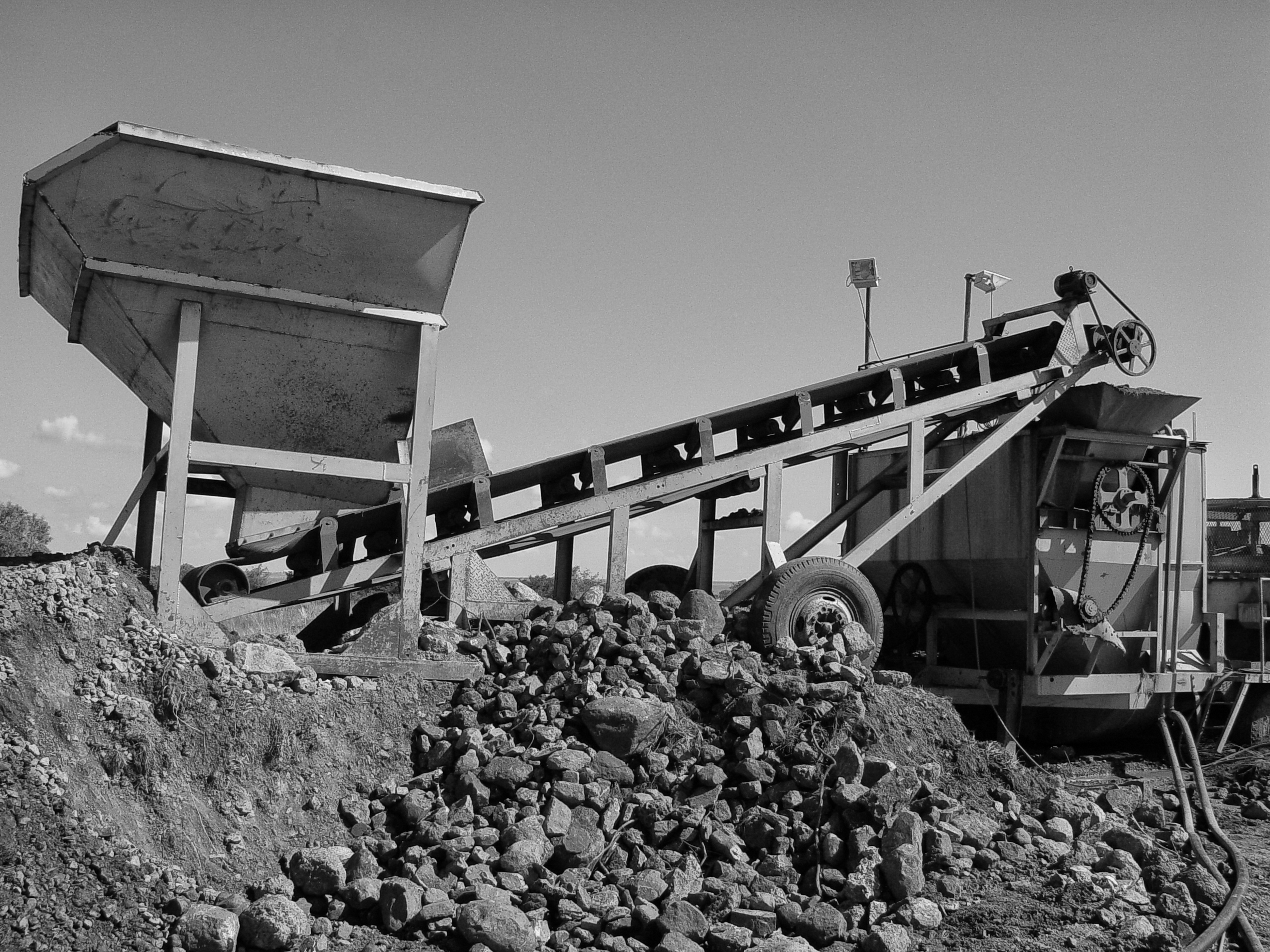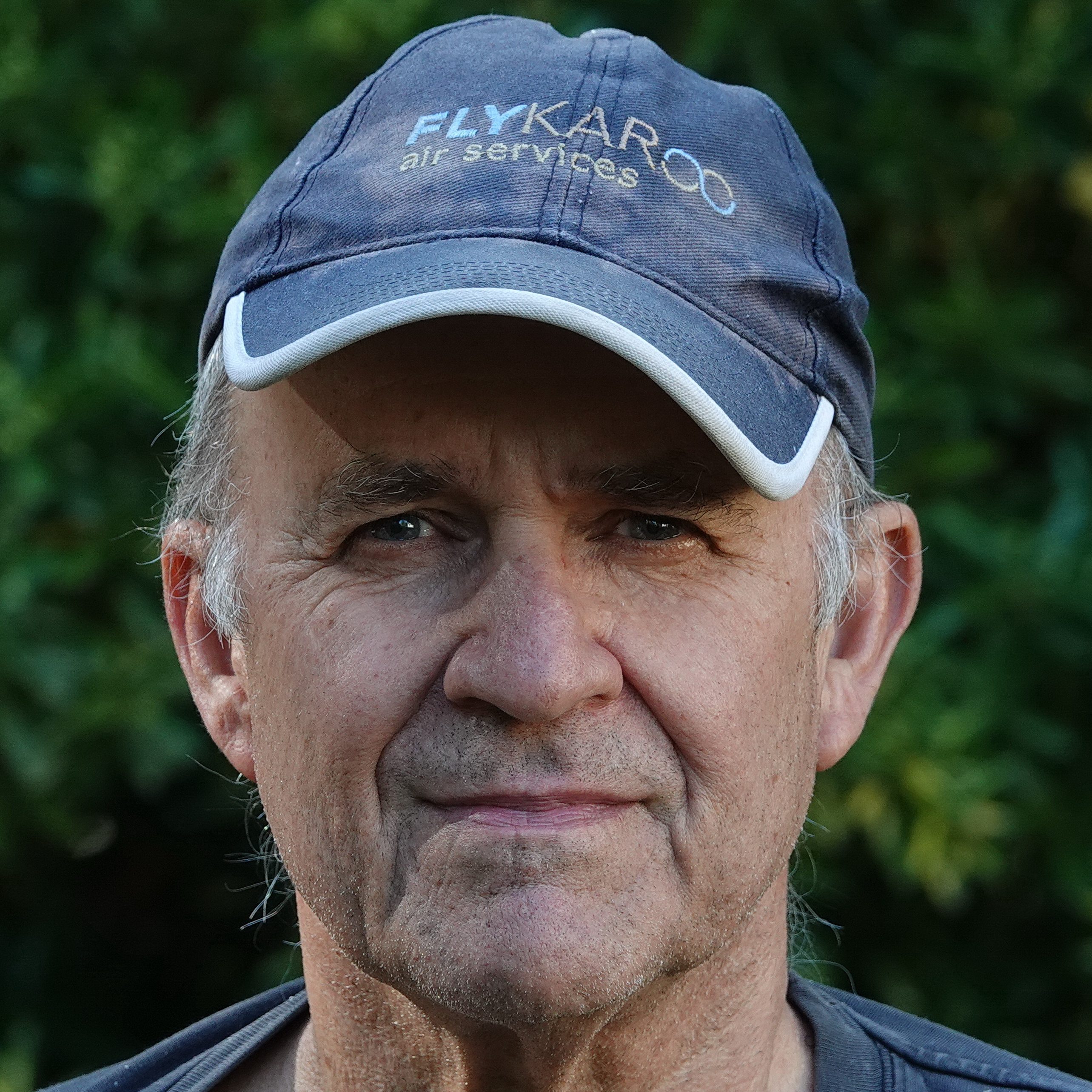Three brothers, built short and square like gnomes, once lived and dug for diamonds in the Wolmaransstad area of North West. One day, so the story goes, they found a “donderse groot goen” (an extremely large stone of immense value) just when they’d practically given up on their diggings.
Such was the shock of discovery that one brother immediately fell to the ground and had himself an epileptic fit. The other ran straight into the bush and was never heard from again. The third one, however, had a bit more sense: he went to town, bought a bottle of brandy and celebrated until the wheels fell off.
 Loading the gravel to be sifted. (Photo: Chris Marais)
Loading the gravel to be sifted. (Photo: Chris Marais)
Now that I write this story, I have to say it sounded a lot funnier when Gert Jacobs of Wolmaransstad told it to photographer Les Bush and I back in the autumn of 2004.
Not many tourists travel through diamond country northwest of Kimberley, but they should.
There is history in the making here, of an industry that began back in the 1920s and somehow never stopped – although it did falter from time to time.
You drive around areas like Lichtenburg, Wolmaransstad, Windsorton and Barkly West, and you see the diggings like massive anthills with machines, constantly tearing up the earth.
Diamonds in the donkey’s grave
If you want to get caught up in the historical account of the most eccentric diamond rush ever, read Weerlig in die Weste: ’n Geskiedenis van Lichtenburg (Lightning in the West: a History of Lichtenburg), by author Johannes de Beer.
He tells the story of how the first diamond in the Lichtenburg area was found on Elandsputte Farm in December 1924, by a worker who was digging a hole for one of the legs of a new cattle dip. He gave the little stone to the owner’s son, Kosie Voorendyk, who in turn took it to the local chemistry teacher for testing.
The teacher was sceptical, but after dropping it into a bottle of acid overnight, it emerged all bright and shiny in the morning.
 An old-time diamond jig on display in Wolmaransstad. (Photo: Chris Marais)
An old-time diamond jig on display in Wolmaransstad. (Photo: Chris Marais)
 Pouring in the concentrate by hand. (Photo: Chris Marais)
Pouring in the concentrate by hand. (Photo: Chris Marais)
Mr Voorendyk Snr then wrote to the state geologist and prospector, a certain Dr Harger, who replied: “Do not excite yourself, there are no diamonds out that way. The stone you found was probably brought there by an ostrich from somewhere else.”
But, to be really sure, Dr Harger drove south to see for himself.
A few kilometres north of Elandsputte Farm, his car broke down. While walking off to a nearby farmhouse to ask for help, Dr Harger inspected the dug-up gravel at the fresh grave of a donkey.
What he saw looked promising, so much so that a few weeks later he came back with a team of workers and 14 fine oxen, and set up a tented camp on Elandsputte. Within the first day of washing the gravel, Dr Harger’s group had found 21 diamonds of various sizes.
Farmer Voorendyk sold more than £40-000 worth of water to the diggers within the initial six months of the operation.
More diamonds were found at other sites in the area, and the world’s eyes were firmly focused on the little dorp of Lichtenburg. Thousands of prospectors pitched up from everywhere. A circus arrived from Australia, and when the ringmaster saw what was going on, he dropped his Big Top and went digging, using the circus elephant to haul water.
Read more: Diamond rush — The precious memories of a diamond dorp on the West Coast
On a sweltering day in February 1926, more than 20,000 eager diggers gathered on Grasfontein Farm for a four-kilometre “claim run”, watched by a massive crowd of cheering onlookers and 300 mounted policemen. Olympic-standard runners were hired for their strong legs, but there were also a few women in skirts and an old gent with a wooden leg among the hopeful competitors.
 The late Les Bush: a fine photographer and fellow traveller. (Photo: Chris Marais)
The late Les Bush: a fine photographer and fellow traveller. (Photo: Chris Marais)
There was a false start, as a few dozen runners suddenly burst forward over the veld. They were cornered by the horseback cops and sent back to the lines. It turns out a little steenbokkie had been flushed and then chased by some of the younger men. This led to such complete chaos that the Minister of Mines postponed the event to March.
For four hectic years, Lichtenburg was the richest public diggings in the world.
It became home to more than 150,000 people, and had a business centre with 250 diamond buyers’ offices and 60 “tearooms”. Then the surface gravels played out, the boom was over, the diggers moved on and the town slumped back into obscurity.
The diamond cutter
Shortly after pitching up in Wolmaransstad, we met with local diamond cutter Fred van Wyk. He sat there working his wheel like a daytime deejay playing some tunes, doing his Fancy Cut. Each stone has its fingerprint, which heightens the creative challenge Fred faces.
“Our diamonds come mainly from the Bamboesspruit, which was once a bigger river than the Orange (now Gariep),” he told us.
“As a child growing up on a farm around here, I was always interested in the stones lying around in the veld. After school, someone offered me a job as a cutter and that’s what I’ve been doing – for more than 20 years.”
 Fred van Wyk, a diamond cutter from Wolmaransstad. (Photo: Chris Marais)
Fred van Wyk, a diamond cutter from Wolmaransstad. (Photo: Chris Marais)
Fred could probably have found a job as a diamond cutter anywhere in the world, but he likes it here in Wolmaransstad.
“The rush seems to be over,” he said. “You have to dig really deep for the diamonds now. A lot of diggers are moving off to more profitable fields in Barkly West and Douglas, but there’s still enough work around here to keep me busy.”
Bushveld brandy tasting
Brandy making was a hobby for Oom Pieter Ernst, but he discovered a serious talent for it. I’m a whisky drinker, but three strong hits of Oom Piet’s Klipspruit Brandy (run-over ice cubes, with a hint of spring water added) made me an immediate convert to the browner stuff.
 One of the Klipspruit Distillery products, in 2004. (Photo: Chris Marais)
One of the Klipspruit Distillery products, in 2004. (Photo: Chris Marais)
A couple of hours later found us deep in mealie country at Doep’s Bar on a social visit. This was a genuine farmer’s pub and restaurant, not simply an after-work refuge for the boys.
The next morning we were with Mariana Marx out at the Uitval Witblits Farm. Mariana is one of only four South African women with a licence to still. She doesn’t produce her velveteen mulekick moonshine in great quantities, and De Wijnwinkel in Wolmaransstad is her major outlet.
“In the old days when a witblits stoker died, the Customs and Excise man would come out and chop down the still with an axe so the children could not continue the tradition,” she said. “We’d like to keep it in the family, and so we renew the licence every year.”
Her husband Frans took us on a tour of his diamond diggings.
“How do you recognise a diamond among all the other stones?”
“Don’t you worry, he stands out like a gentleman in a tuxedo in a crowd of labourers,” he replied. And he was right. Even though he had salted one of the pans with some diamonds, the thrill of discovery was still there as we spotted the shiny stones.
However, instead of running off with both arms waving, we left the little diamonds right there and returned to Mariana’s still for another fine shot of bushveld grape juice. DM


This is a short chapter excerpt from Karoo Roads IV – In Faraway Places (360 pages, black-and-white photography, R350 including taxes and courier in South Africa) available from September 2024. Anyone interested in pre-ordering a first edition, author-signed copy should please contact Julie at julie@karoospace.co.za for more details.
The Karoo Quartet (Karoo Roads 1 – 4) consists of more than 60 Karoo stories and hundreds of black-and-white photographs. Priced at R960 (including taxes and courier in South Africa), this Heritage Collection can also be ordered from julie@karoospace.co.za




 One of the Klipspruit Distillery products, in 2004. (Photo: Chris Marais)
One of the Klipspruit Distillery products, in 2004. (Photo: Chris Marais)
